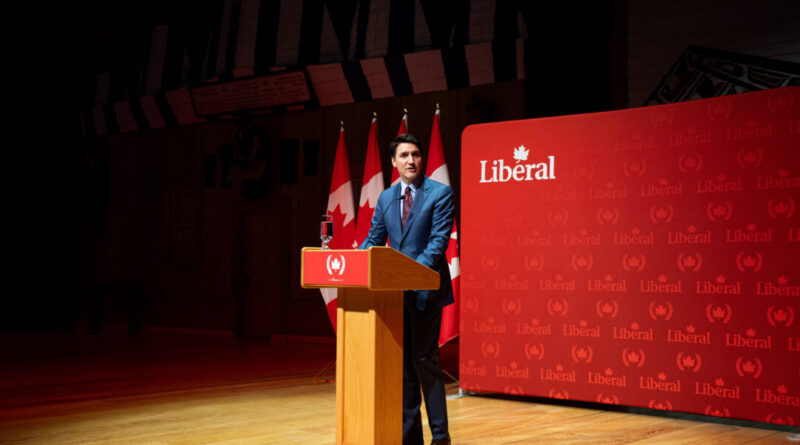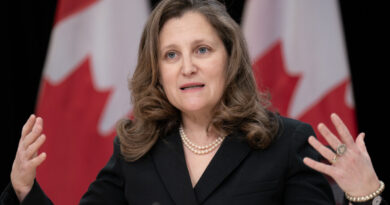How Would the Liberal Party Change after Trudeau’s Leadership?
News Analysis
Looking at the state of some of the modern-day brands of provincial Liberals may offer a clue as to what a post-Trudeau Liberal Party of Canada might look like.
Although there are no vibrant provincial Liberal parties west of Ontario, they remain a recognized brand on the provincial level in some central and eastern provinces.
This includes in New Brunswick, where the provincial Grits came to power this year, and Newfoundland and Labrador, where the government is Liberal. In the two most populous provinces, the Ontario Liberals are trying to make a comeback from third-party status with a new leader, and a leadership race is ongoing in Quebec after the party obtained its lowest voter share ever in the 2022 election.
Some of those Liberal leaders or leadership contenders have attempted to distance themselves from the federal Liberals’ policies and the Trudeau brand, while others have come out with policies more to the right of the political spectrum.
Ontario’s Crombie Going for Centrist Brand

Ontario Liberal Leader Bonnie Crombie talks to media in Toronto on Dec. 5, 2023. The Canadian Press/Chris Young
She has said that her party had previously moved too far to the left and that she is a “centrist,” or “even right-of-centre.” The Liberal Party had in the past decades traditionally been identified as a centrist party.
The last Liberal government in Ontario, under Kathleen Wynne, was defeated in 2018 by the Progressive Conservatives (PCs). The PCs had campaigned against rising electricity prices (and cancelled renewable energy contracts when they came into power) and the provincial cap and trade program, and said they‘ll oppose any federal carbon tax, while promising other tax cuts. The PCs also campaigned against the Liberals’ controversial sex-ed curriculum, and said they’ll improve education and healthcare. Some of the senior staffers of the Wynne Liberals moved to the Trudeau Liberals after they won the federal election in 2015.
Crombie has signalled that she is going in a more fiscally conservative direction. She announced last month that a Crombie government would reduce the income tax rate for middle-class families and remove the provincial sales tax from home heating and hydro bills.
In March, Crombie said she would not introduce a provincial carbon tax if she becomes premier, making the announcement following weeks of attacks from the Progressive Conservatives labelling her the “queen of the carbon tax.”
She has also been critical of the federal government’s carbon tax policy, saying in a Dec. 3 speech, “I’m not here to tell the prime minister how to do his job, but I promise you I will tell him when I think he’s wrong. Like on the carbon tax, he’s wrong.”
“I’d rather cut your income taxes permanently than cut you a rebate cheque,” she said, in reference to the rebate sent by Ottawa to Canadians to offset the carbon tax.
Gripes about the carbon tax have been made by other provincial Liberals as well. In Newfoundland and Labrador, Liberal Premier Andrew Furey requested that the federal government delay its April increase of the carbon tax, arguing that the province did not have the adequate infrastructure to switch to renewable energy options.
Following a provincial byelection loss in April, Furey blamed the federal carbon tax and accused Trudeau of being “sclerotic in his approach on this ideologic marriage that he has to this principle.”
The federal Liberals provided a three-year carbon tax break on home heating oil to appease growing resentment in the Atlantic provinces last fall, but otherwise have defended the policy as essential to their agenda to fight climate change.

Newfoundland and Labrador Premier Andrew Furey fields a question at the Confederation Building in St. John’s, N.L. on July 28, 2021. The Canadian Press/Andrew Vaughan
New Brunswick an Outlier
The focus on everyday economics and balanced budgets was also seen in the New Brunswick Liberals, who were the sole good news bearers for the Liberal brand this year.
During her Oct. 21 acceptance speech, the province’s first woman leader, Susan Holt, promised to “watch the bottom line and deliver fiscal responsibility” while also making investments in education, health care, and housing. Holt also said she would remove the provincial sales tax from the construction of new rental housing.
Removing the GST on new builds has also been promised by federal Conservative Leader Pierre Poilievre as a measure to speed up home construction and improve affordability.
Holt went back on her campaign promise to eliminate the provincial sales tax on electricity bills, opting to instead pay for an equivalent rebate to ratepayers on monthly bills from utility companies.
Social Issues
“Ontario Liberals passed Toby’s Act to amend the Human Rights Code with respect to gender identity and gender expression. Ontario Liberals provided the option to display an ‘X’ in the sex field of their driver’s licence or health card, to ensure the fair, ethical and equitable treatment of people with trans and non-binary gender identity,” she said on the X platform.

New Brunswick Premier Susan Holt answers media questions in Fredericton on Nov. 12, 2024. The Canadian Press/Stephen MacGillivray
Holt’s Liberals in New Brunswick have also been very critical of the previous Progressive Conservative government’s legislation requiring parental consent before kids can change pronouns at schools. Her government also brought in changes to allow medicare to cover surgical abortions administered outside hospitals.
- What We Know So Far About the Wisconsin Christian School Shooting
- Couple’s Dream Vacation Turns into 3-Day Wild Goose Chase, Air Canada Forced to Pay $10,000





